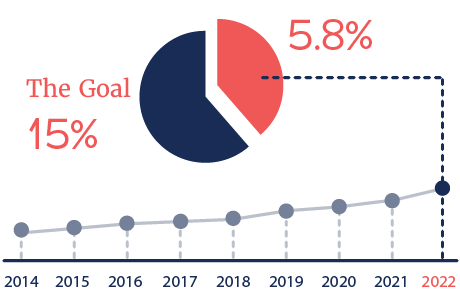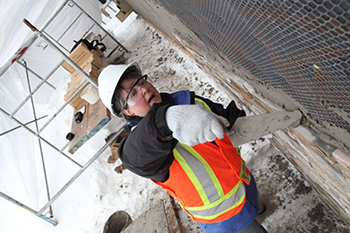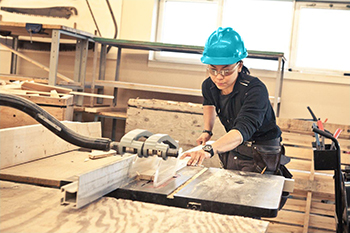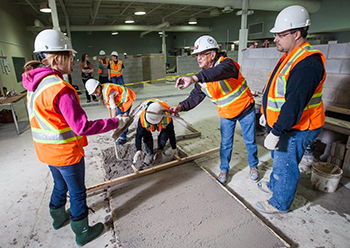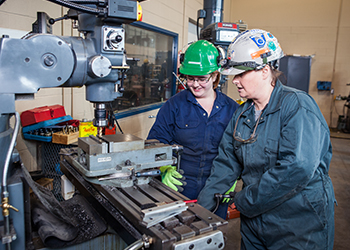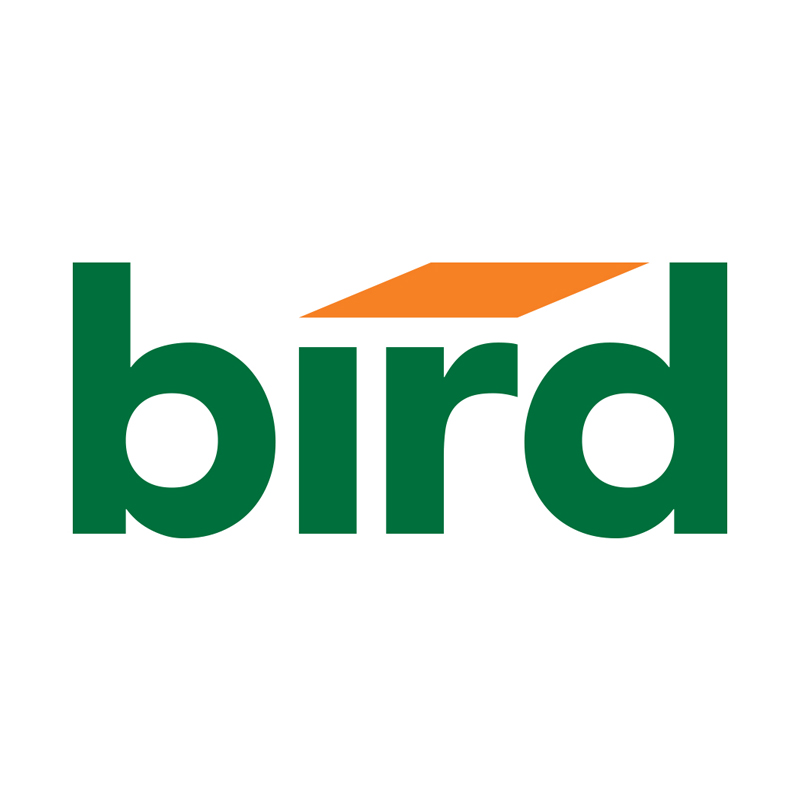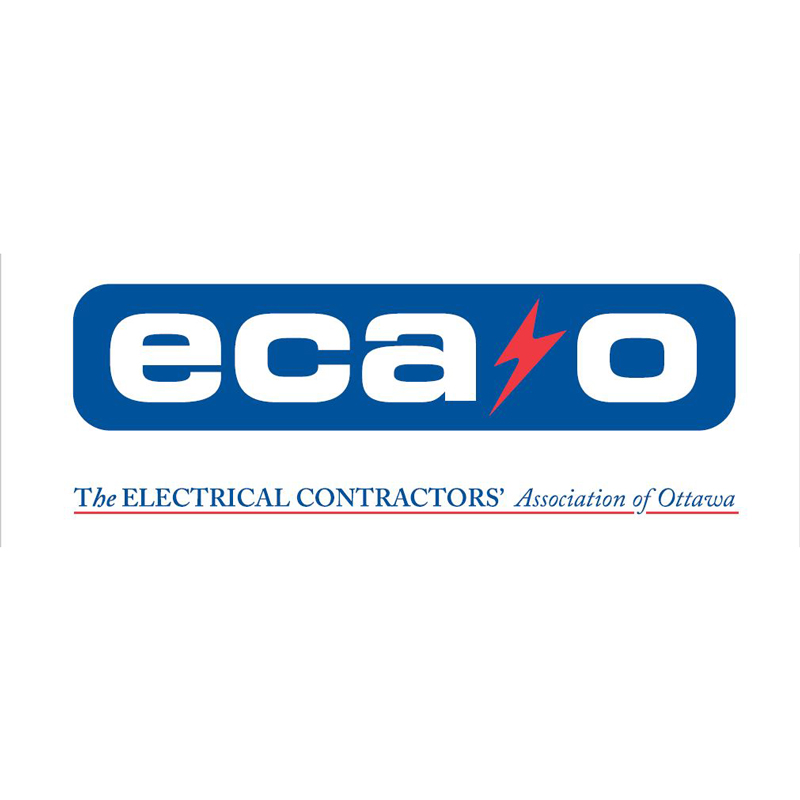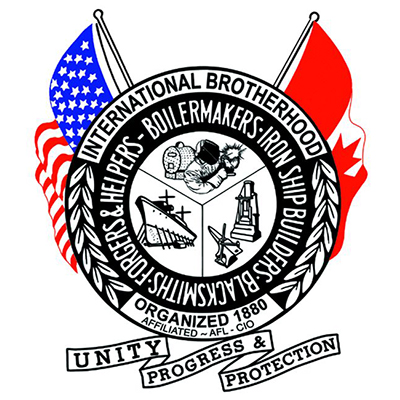#CHAMPIONS4CHANGE
Join us and promote change for women working in the skilled trades
A Community Action Strategy
The National Strategy to Support Women in the Trades was developed by employers, labour representatives, educators and equity CAF-FCA defines an equity groups or under-represented groups as those who self-identify as women, men, lesbian, gay, bisexual, transgender, queer, two-spirited, asexual, pansexual, inter-sexed, gender non-binary, Indigenous peoples, visible minorities, immigrants and persons with disabilities. representatives from multiple trades and regions to create sustainable and measurable change for women. This effort is being led by the Canadian Apprenticeship Forum (CAF-FCA), a national, non-profit organization.
The Strategy includes the following goals:
- Increase the number of women apprentices, journeypersons CAF-FCA defines journeyperson as an individual who has obtained a Certificate of Qualification and Red Seal endorsement of their provincial/territorial trade certificate. and supervisors where they are underrepresented in proportion to the total number in a skilled trades workplace.
- Create respectful and welcoming workplaces through meaningful policy and education. Workplaces should be safe, healthy, inclusive An inclusive work environment is defined by inclusion expert Siyana Sokolova as “A working environment that values the individual and group differences within its work force. It enables a company to embrace the diversity of backgrounds and perspectives of the employees, which in turn increases their talent, innovation, creativity and contributions. An inclusive workplace makes diverse employees feel valued, welcome, integrated and included in the workforce instead of isolated. Other significant characteristics of the inclusive workplace are that everybody has equal access to opportunities. There is also open communication and information sharing as well as shared accountability and responsibility. and equitable, free of harassment Harassment is defined by the Canadian Centre of Occupational Health and Safety as “Offending or humiliating someone physically or verbally, threatening or intimidating someone or making unwelcome jokes or comments about someone’s race, national or ethnic origin, colour, religion, age, sex, sexual orientation, marital status, family status, disability or pardoned conviction.”, bullying The Canadian Human Rights Commission defines bullying as “An intentional, repetitive pattern of aggressive behaviour accompanied by an imbalance of power between perpetrators and victims. Examples include: physical (i.e. hitting, kicking, spitting, pushing, and stealing or breaking personal belongings, etc.), verbal (i.e. taunting, malicious teasing, name calling, and making threats) and psychological (i.e. spreading rumours, manipulating social relationships, or engaging in social exclusion, extortion, or intimidation tactic.”, and discrimination.
Develop a call-to-action campaign where champions are recognized and tools for change are provided. Create a national movement that includes all stakeholders.
Work with all levels of governments to implement diversity targets on infrastructure projects. Hold employers and unions accountable by publishing actual hiring numbers. Create pressure for policy change.
Develop toolboxes for employers, labour organizations, educators & tradeswomen and their allies where they can access information & tools for creating a respectful workplace. Create an understanding that organizations need to develop and implement a concrete action plan. No more excuses.
Set a measurable target; track & publish results. Create awareness of actual proportion of women in the workplace and outline a plan to increase the representation of women. Make employers and unions accountable.
Strategy Development
Over 300 women apprentices and journeypersons identified action items for change at CAF-FCA’s Supporting Women in Trades Conferences. A National Task Force representing members from the apprenticeship community identified strategic priorities based upon the feedback from the women apprentices and journeypersons and developed a Call to Action for Industry.
The SWiT Strategy is comprised of 4 SMART Actions. These actions are specific, measurable, attainable, relevant and time-based.
This is a national movement. Create awareness of available tools and resources. Campaign for change.
Policies must change. Government, employers and unions must be accountable for diversity on projects. Provide incentives.
The time for action is now. Employers must lead the way through the hiring, training and support of women. Recognize Champions.
Plan for Change. Commit to changing the ratio of women to men on worksites. Engage all staff.
Why Targets?
From 2020 to 2030, the aim is to increase the proportion of women apprentices and journeypersons who work on-the-job.
Change will occur incrementally with the overall goal of 15% per cent by 2030. Percentages represent the proportion of women who work on-the-job. Having a proportion ensures there is more than one woman working on a project.
Targets include apprentices and journeywomen. Including both groups ensures that inexperienced entry level apprentices and more experienced tradeswomen secure employment.
The baseline figure (4.5%) represents total female apprenticeship registrations as of 2018 based on information from the Statistics Canada Registered Apprenticeship Information System. The figure includes trades in the construction, manufacturing and transportation sectors.
Make the Pledge – Your Commitment
We all play an important role. Share information about CHAMPIONS4CHANGE to industry partners. If you hire and train women apprentices & journeypersons commit to making a difference by pledging to:
Be part of the solution. Commit to hiring and training more women and creating healthy, safe and inclusive workplaces through policies, education and tools for management, supervisors and employees.
#CHAMPIONS4CHANGE
Become a Champion
These organizations have made the promise to do their part to support women working in or exploring employment opportunities in the skilled trades. Champions have acted and commit to sharing their progress through reporting.
CAF-FCA does not have capacity to track or enforce any commitments made in the pledges. Industry and the skilled trades community hold Champions accountable.
Become an Ally
Organizations that are not actively involved in hiring or training apprentices can act as allies by identifying and addressing barriers women face in skilled trades workplaces. Through programs and policies, SWiT Allies advocate and support the overall goal of 15% representation of tradeswomen by 2030.
- Alberta Women in Trades
- ApprenticeSearch.com
- Bay City Electrical Ltd.
- BC Center For Women in The Trades
- Breck Construction
- British Columbia Construction Association
- Canadian Union of Skilled Workers
- CareerLabsVR
- CLAC
- College La Cité
- Congress of Aboriginal Peoples
- Dewar Industrial Services Inc.
- Durham College
- emPOWER - Women in Trades
- Finning - Calgary
- Greater Trail Community Skills Centre
- GTTI Skilled Trades Institute
- Helga Wear Inc.
- IBEW Local 230
- Interfor Corporation
- Ironworkers Local 765
- Journeywomen Ventures
- KKETS
- Kootenay Women in Trades & Technology Assoc.
- Métis Nation of Ontario
- National Electrical Trade Council - NETCO
- New Boots: Progressing Women in Trades - MAP Strategic Workforce Services Inc.
- NWT & Nunavut Construction Association
- Office to Advance Women Apprentices
- Ottawa Community Loan Fund
- Quinte Home Builders Association
- Roofing Contractors Association of British Columbia
- Sabre Ltd.
- SAIT
- The INSIDE View
- Trailblazers Inc.
- True North Women's Safety Apparel
- UNIFOR
- VanHerc Electrical Solutions Inc.
- Women In HVAC-R
- Women in Mechanical Construction (WIMC)
- Women in Resource Development Corporation
- YMCA of Hamilton
- YMCA-YWCA of the National Capital Region
- Yukon Women in Trades and Technology
- YWCA of Halifax
Promote
Share information and resources available at switcanada.ca to your members, partners and other influencers in your networks. Connect potential CHAMPIONS4CHANGE with CAF-FCA for verification and onboarding.
Educate
Institute policies and programs that support inclusive organizational cultures, pay equity and actively seeking out diverse talent. Involve all levels of leadership and staff on efforts that prevent workplace bullying, harassment and violence.
Amplify
Show your support of the organizations who hire, train and have pledged to be #CHAMPIONS4CHANGE. Recommend women candidates for apprenticeship or skilled trades employment opportunities on the tools. Use the resources provided by CAF-FCA to further the movement and profile your participation.
Tools4Change
Discover resources for creating healthy, safe, and inclusive workplaces
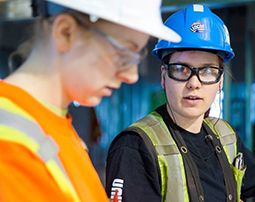
Employers

Labour

Tradeswomen

Educators
RESOURCES FOR
Employers
Hiring Women There are resources available across the country to help you recruit women apprentices and journeypersons. Find organizations in your area who link women interested in a career in the skilled trades to employers. Often, these organizations will provide ongoing support to your apprentices during their employment and training.
Multi-Provincial Programs The Offices to Advance Women Apprentices help employers find female apprentices and journeypersons. OAWA provides wraparound supports to tradeswomen and employers. They offer career counseling to women interested in trades careers, a mentorship program for employers and a platform to connect through a strong relationship with trades unions. Established in 2009 in Newfoundland and Labrador, OAWA now has offices in six provinces listed below.
Manitoba: https://www.womenapprentices.ca/manitoba/
New Brunswick: https://www.womenapprentices.ca/new-brunswick/
Newfoundland and Labrador: https://www.womenapprentices.ca/newfoundland-labrador/
Nova Scotia: https://www.womenapprentices.ca/nova-scotia/
Prince Edward Island: https://www.womenapprentices.ca/prince-edward-island/
Saskatchewan: https://www.womenapprentices.ca/saskatchewan/
These provincial organizations connect employers to women apprentices and journey candidates:
British Columbia BC Centre for Women in the Trades (BCCWITT) helps employers find women apprentices and journeypersons, provides networking and mentoring for women, Just Workplace education as well as the Be More Than a Bystander training for employers, unions and training providers.
Since 2006, Skilled Trades Employment Program (STEP) BC has connected motivated equity-seeking candidates with construction jobs in BC. If you’re interested in a career in the skilled trades, STEP can connect you to trusted employers who are hiring and help you get job-ready.
Nova Scotia Women Unlimited
Ontario Women’s Enterprise Skills Training (WEST)
Alberta Women Building Futures
Creating a Healthy, Safe and Inclusive Workplace Creating healthy, safe and inclusive workplaces starts from the top down. It must be reflected from management to workers on job sites. There are many programs and resources to help employers ensure their workplaces are welcoming to all and free of harassment and bullying.
Build Together is an initiative of Canada’s Building Trades Unions (CBTU) that promotes, supports, and mentors women in the skilled construction trades. Training presentations, guidebooks and simple forms can be adapted to any work environment for creating a safe and welcoming work.
Build Force Canada developed The Respectful and Inclusive Workplace Toolkit with input from industry and offers the support needed to assist the construction and maintenance industry in creating a respectful and welcoming workplace for everyone.
BC Centre for Women in the Trades (BCCWITT) offers Be More Than a Bystander Training for tradespeople to prevent gender-based bullying and harassment. In addition, they offer Just Workplace training, tools and resources to support all organizations with creating equitable and inclusive workplaces.
On the Level Women Working in Trades and Technology: An Employer’s Guide to Creating Respectful Workplaces provides tips for integrating Women into skilled trades workplaces
The Builders Code sets a standard code of conduct for workers on construction sites and defines an “Acceptable Worksite” as the starting point for reducing risk and ensuring a safe and productive environment for all workers. It offers relevant no-fee resources including HR policies, advisory services, and training.
Canadian Coalition of Women in Engineering, Science, Trades and Technology CCWESTT’s We Are Trades provides employers with actionable steps to establish a safe and inclusive workplace for women. Access the process and resources you’ll need to make meaningful change within your workplaces and show your support within your networks.
Women in Resource Development Corporation based in Newfoundland and Labrador, provides a variety of employer services including workplace assessments, diversity policy development, recruitment assistance and workshops and training.
RESOURCES FOR
Labour
Recruiting and Retaining Women As labour shortages loom and skilled tradespeople retire, resources that address barriers and support a diverse workforce create a competitive advantage. There are several organizations dedicated to helping address the barriers women encounter upon entry to and advancement in the trades. These are experts in diversity strategy, creating respectful workplaces and creating positive outcomes. Many of the organizations listed below facilitate connections between tradeswomen candidates and unions, contractors, and employers by offering pre-screening, mentoring and ongoing support and during their employment.
Diversity Best Practices Using Balance to Build, a report from Diversity Network on supporting gender diversity in NL reflects how reducing systemic barriers, creating respectful workplaces and instilling an organization-wide culture of diversity can move the needle on women’s participation in the skilled trades. Key practices for success include:
- Senior management leadership – a zero-tolerance policy for workplace harassment and discrimination must start at the top and filter down to all levels. Consider setting up a diversity committee for your organization and review progress on a regular basis.
- Make diversity a priority – show a commitment to supporting women in the workplace by employing a dedicated representative who collaborates with senior management. Foster communication. Address and resolve any issues in a timely manner.
- Union engagement – collaboration between diversity and union representatives improves recruitment and retention of diverse groups. Discuss female participation when negotiating collective agreements. Openly share hiring processes and targets.
More information on proven and tested best practices is available from the Policy Group on Tradeswomen’s Issues. PGTI is a collaboration of stakeholders working together since 2008 to crush the barriers to women’s access to good paying careers in the construction trades.
Multi-provincial programs An initiative of Canada’s Building Trades Unions, Build Together focuses on the recruitment and retention of workers from underrepresented portions of the population. Download this resource outlining how to create a safe and welcoming workplace:
Creating a Safe and Welcoming Work Environment: A Handbook for Employers, Contractors and Unions
There are a number of organizations across Canada which do outreach and provide support for unions and employers that facilitate the recruitment and retention of women. Some of these best practice models include:
BC Centre for Women in the Trades
Office to Advance Women Apprentices
Women in Resource Development Corporation
Additional information including Trades Discovery, Pre-Employment and Pre-Apprenticeship Training programs and financial supports for women are available on the CAF-FCA Skilled Trades Network
Many unions and labour organizations have or partner on initiatives for women. Discover what types of work and training supports are available from:
RESOURCES FOR
Tradeswomen
There are numerous programs and groups across the country whose work is focused on supporting women in the trades.Some of the primary sources for networking and guidance for tradeswomen are private Facebook groups. Search “women in trades” to access networks for your trade, sector and region. A great place to start is Canadian Women in the Trades
There are initiatives within provinces and territories you can look to for support:
Alberta
BC
Women in Trades Training (WITT)
Manitoba
Office to Advance Women Apprentices
New Brunswick
Newfoundland and Labrador
Office to Advance Women Apprentices
Nova Scotia
Office to Advance Women Apprentices
Nunavut
Ontario
Prince Edward Island
Office to Advance Women Apprentices
Saskatchewan
Office to Advance Women Apprentices
Yukon
Other national programs and sector-specific resources are directed toward increasing women’s participation in the trades:
Build Together, Women of the Building Trades is a national CBTU program that promotes, supports and mentors women in the skilled construction trades.
The Canadian Association of Women in Construction facilitates the long-term success of women in Canada’s construction-related fields such as general contracting, trades, building products, architecture, engineering, interior design, and professional services.
Canadian Construction Women provides members with opportunities for support, mentoring, networking, community involvement, learning and development.
Futurpreneur Canada is a national non-profit organization that provides financing, mentoring and support tools to aspiring business owners aged 18-39.
Women in HVAC-R provides a forum to promote the inclusion and advancement of women in the Heating, Ventilation, Air Conditioning and Refrigeration (HVAC-R) industry in Canada.
WinSETT Centre is an action-oriented, non-profit organization that aspires to recruit, retain and advance women in science, engineering, trades and technology (SETT).
The Electrical Joint Training Committee support efforts by unions and employers to make the workplace welcoming and respectful so that women will want to stay on the job through Women in Electrical Trades.
Women of Steel supports women in welding, through strategic engagement programs, both virtual and hands on learning, that connect introductory welders to mentors.
Check out even more resources listed on the Skilled Trades Network and get information about pre-apprenticeship programs, financial supports and local networking groups. Search for women’s resources nationally or by province/territory.
Be safe on-the-job Employees have the right to a safe workplace that includes safe and accessible washrooms. Access organizations which oversee occupational health and safety across Canada.
RESOURCES FOR
Educators
Educators play a vital role in ensuring that young women and girls are given equal opportunities to explore career options in the skilled trades. Be informed and unbiased when speaking with students. Create a classroom culture that is welcoming and inclusive to all students, including those from underrepresented groups.
Elementary & Secondary School Often educators in the secondary and elementary school educational system have limited knowledge, resources and information regarding careers in the skilled trades. It is difficult to promote apprenticeship and skilled trades careers, especially to young women or girls where often they are not considered viable. In 2008 the Canadian Apprenticeship Forum (CAF-FCA) and Skills/Competences Canada created careersintrades.ca to inform, and provide resources for educators, students and parents.
Youth apprenticeship programs are offered in many provinces and territories and allow students to experience what it’s like to work in a trade before graduation. These free programs often allow young people to earn credit toward their diploma AND a post-secondary apprenticeship program.
Your provincial/territorial apprenticeship authority may have additional resources to help students of all ages explore the skilled trades.
Post Secondary Postsecondary educators provide much of the in-class training for apprentices. Beyond transferring technical knowledge, instructors can also shape apprentice “soft skills” such as collaboration and positive interpersonal communication and best practices to demonstrate inclusivity and respect in the classroom. They are:
- Organize an orientation session: Engage apprentices in interactive activities about gender equity and culture at the beginning of the course to set the right tone and to ensure apprentices know about the available support services.
- Establish clear and consistent classroom rules and establish a Code of Conduct: Create classroom rules with the apprentices. Apprentices will be more likely to respect and follow the rules if they contributed to their development. Rules should deal with respecting the instructor and fellow classmates and participation in class. Throughout the course, check-in with the class regarding how well they are functioning as a team and whether the Code is being adhered to.
- Ensure balanced participation in the classroom: For each activity, emphasize inclusion of women, trans and non-binary people through speaking, presenting, demonstrating, role playing, answering and asking questions, writing and leading group activities. Ensure that learning materials are available and distributed equally to include underrepresented groups.
- Feature tradeswomen in the class: Have a woman journeyperson lead the class in an activity to show the apprentices women can be experts in the trades. Have an assignment where apprentices interview a woman journeyperson. Invite a woman journeyperson as a guest speaker so she can share her career journey and be a role model to the apprentices. Rather than bringing attention to “women in the trades” find ways to normalize it.
Many post secondary institutions offer pathways and discovery programs for women interested in skilled trades training. Discover these on the Skilled Trades Network where you can search by province/territory.
Some institutions have Women in Trades and Technology (WITT) coordinators on campus. WITT is a group that increases opportunities and supports for women in technology and trades in all fields, through a rich networking and support community. More information is available from participating schools on the WITT Facebook page.
Check out the following initiatives from CAF-FCA Champion members that actively create opportunities for women in the skilled trades:
Conestoga College Institute of Technology and Advanced Learning
Humber Institute of Technology and Advanced Learning
The Data
The Current Number
